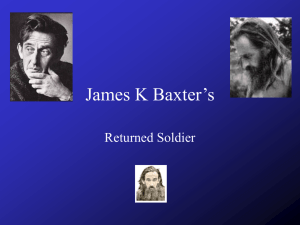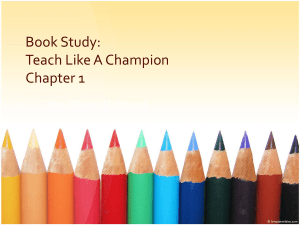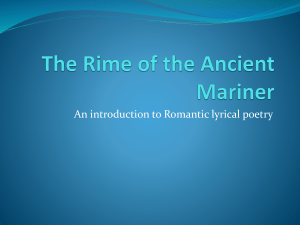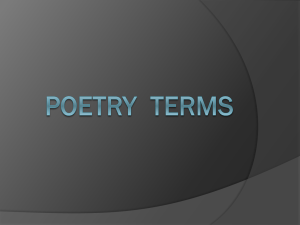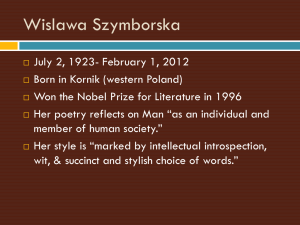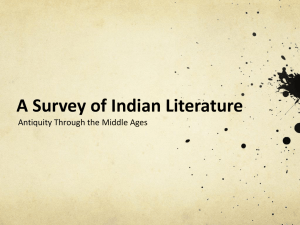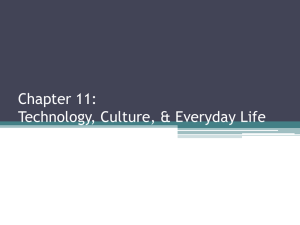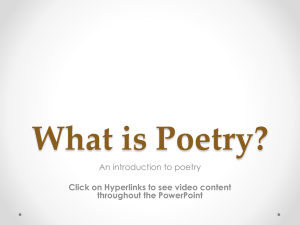File - Bethany Little
advertisement
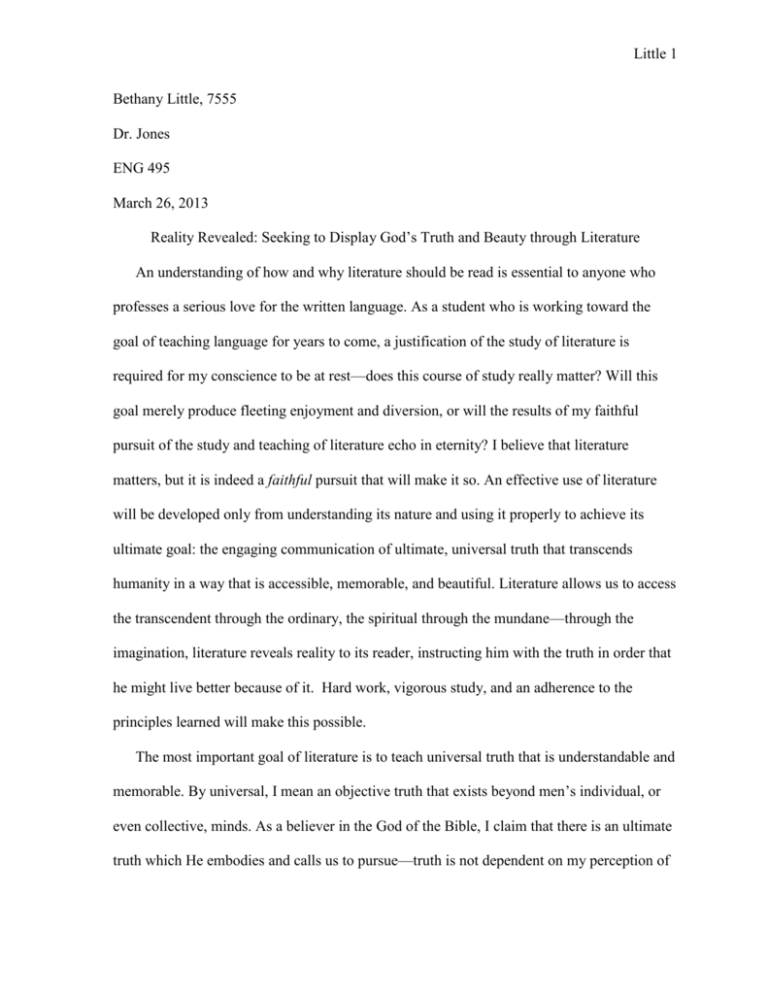
Little 1 Bethany Little, 7555 Dr. Jones ENG 495 March 26, 2013 Reality Revealed: Seeking to Display God’s Truth and Beauty through Literature An understanding of how and why literature should be read is essential to anyone who professes a serious love for the written language. As a student who is working toward the goal of teaching language for years to come, a justification of the study of literature is required for my conscience to be at rest—does this course of study really matter? Will this goal merely produce fleeting enjoyment and diversion, or will the results of my faithful pursuit of the study and teaching of literature echo in eternity? I believe that literature matters, but it is indeed a faithful pursuit that will make it so. An effective use of literature will be developed only from understanding its nature and using it properly to achieve its ultimate goal: the engaging communication of ultimate, universal truth that transcends humanity in a way that is accessible, memorable, and beautiful. Literature allows us to access the transcendent through the ordinary, the spiritual through the mundane—through the imagination, literature reveals reality to its reader, instructing him with the truth in order that he might live better because of it. Hard work, vigorous study, and an adherence to the principles learned will make this possible. The most important goal of literature is to teach universal truth that is understandable and memorable. By universal, I mean an objective truth that exists beyond men’s individual, or even collective, minds. As a believer in the God of the Bible, I claim that there is an ultimate truth which He embodies and calls us to pursue—truth is not dependent on my perception of Little 2 it. The primary concern of literature should be to reveal this truth, to make it accessible and understandable in a way that will affect change in the lives of its readers. The question of subject matter, what literature should address, reaches through time to Aristotle. In order to communicate the instruction of virtue, what kind of content should literature be concerned with? Are space ships and faeries at all appropriate in a medium that is concerned with teaching objective truth? As a reader and writer whose imagination thrives on such things, I am profoundly concerned with this question. To find the answer, I look to Aristotle. Though he does not address the specific questions of faeries perhaps, I believe that the spirit of Aristotle’s philosophy teaches that regardless of the characters or setting, a work will be effective if it accurately imitates life—literature should be an accurate representation of the human nature that we encounter daily. To many ears, the word “imitation” sounds both cheap and simple. This view is one held by Plato, who believes imitation is a practice which only removes the viewer’s (or reader’s) understanding of the object further away from the reality. In his opinion, one should try to understand a bed, for example, by observing the bed itself, not an imitation of it through art or poetry (4-5). Furthermore, he perceives that poets are being dishonest by imitating things on which they personally are not the experts. For instance, because Homer was not himself a war general, he should not be writing of battle in such a way that would suggest he is an expert in the field (6). Aristotle reacts against this idea, rather claiming that imitation, or “mimesis,” is the natural and therefore universal method by which learning takes place: “[Man] is the most imitative of living creatures, and through imitation learns his earliest lessons; and no less universal is the pleasure felt in things imitated” (21, sec. 4). Therefore, by accurately imitating human nature, instruction occurs. However, it is essential to realize the poet’s role in this dance of imitation—it is not his duty Little 3 to merely record events directly as he observes them; rather, he must be concerned with what might probably happen in any given situation. The beauty of poetry is that the poet may use his imagination as freely as he chooses, and still instruct objective truth (given he follows the aforementioned guidelines). Aristotle states, “[I]t is not the function of the poetry to relate what has happened, but what may happen,—what is possible according to the law of probability or necessity” (26, sec. 9). Aristotle is primarily concerned with the universal laws and tendencies of human nature, what things are probable to happen according to those laws, and what things are necessary as dictated by the law of cause and effect. In fact, many situations that are merely observed and recorded do not reveal the heart or the motives of the nature of man. By observing the law of probability and necessity, the poet is able to create a sequence of action that is true to human nature while at the same time revealing the motives and secrets of the heart. So we see that with these principles present, matters such as setting and the physical form of characters ceases to be so important. Edmund Spenser’s The Faerie Queene is a wonderful illustration of this truth. There are elements of spells, magicians, knights, and monsters. Yet the depth of insight that Spenser gives us into the quest of the man striving for holiness and the trials that face him is a clear reflection of the Christian walk through the fallen world that every reader can learn from, and live better for it. Imitation of human nature can include, but is not limited to, the exact events we observe in our daily lives. For this reason, literature entices those from countless backgrounds to undergo an experience dissimilar from our lives, but yet resonating deeply with our nature as men, teaching us how to live. Simply because the main goal of literature is to teach truth, it does not exclude other goals that need to be met along the way. In “Preface to Lyrical Ballads,” William Little 4 Wordsworth asserts that though truth is an objective of poetry, the primary goal of literature is to delight, to inspire pleasure in its readers: “The Poet writes under one restriction only, namely, the necessity of giving immediate pleasure to a human being [. . .] it is a homage paid to the native and naked dignity of man, to the grand elementary principle of pleasure, by which he knows, and feels, and lives, and moves” (248-49). His opinion does not match up with the primary goal I believe to be correct, that of revealing truth to its readers, but that by no means suggests that beauty and pleasure are not integral components of what good literature is. I prefer to view the process of writing good works as a form of vertical ladder. At the top, there is the teaching of objective, transcendent truth. But perhaps the middle rung, which must be passed in order to reach the ultimate goal, is the expression of beauty and the communication of pleasure to the reader. So though this is not the ultimate goal of literature, it is a necessary step to getting there. There are some wonderful pieces of literature that get to that middle rung, and stop. They are beautiful, they are delightful to read—but is the reader left changed for the better after reading it? I believe a good example of poetry that is immensely beautiful but fails to consistently teach transcendent truths is the work of Edgar Allen Poe. Truthfully, it was his poetry that first created the spark of a love of literature within me, a love for something beyond just pleasant stories. The musicality of his verses will forever inspire me as they run through my mind with their lilting patterns, “And so, all the night-tide, I lie down by the side / Of my darling—my darling—my life and my bride” (38-39 ). However, though it is dear to my heart, his poetry is not something I can point to as work that changed my life. Indeed they are beautiful, and in that they do reflect the beauty of the Maker who created language—but Poe stops at being beautiful, and does not take that Little 5 next step to the teaching of transcendent truth. His works are good, incredible works of craftsmanship, but they fall short of reaching their full potential as literature. Though poets cannot let it be the only goal, the expression of delight to the reader is essential to the purpose of literature because it makes the truth it teaches memorable and understandable. In his work “An Apology for Poetry,” Phillip Sidney refers to poetry as a “speaking picture,” one which acts as a moderator between the disciplines of history and philosophy, while at the same time exceeding them both in merit. Sidney claims that though philosophy may be truthful in all it says, that it may be urging man to adopt precepts that are right and necessary, it falls short of poetry for three reasons: it is abstract, it is not memorable, and it does not motivate. Philosophy is very difficult to read and to understand; Sidney claims that even if the reader does make it through the tedious material and leaves with some understanding of what he has read, it is not easy to remember, and therefore challenging to apply to a practical life: “For [the philosopher’s] knowledge standeth so upon the abstract and general, that happy is the man who may understand him, and more happy that can apply what he doth understand” (110). Philosophy does not give us practical examples of how to apply the good precepts it teaches, and so remains in the abstract and is easily forgotten. History, on the other hand, provides us with facts, dates, and events, but is not free to explore the precepts and motivations behind those occurrences. Also, history has knowledge of isolated events, yet cannot connect them, resulting in a very limited gain of understanding of human nature. The historian is so concerned with picking exact details and records from the past that he may only speak of examples, but cannot connect them with the abstract truths that these examples teach. Little 6 Poetry, according to Sidney, acts as a Moderator between these two disciplines because it does both, and is not leaving out either the precept or the example. Poesy is a “speaking picture” in that: “whatsoever the philosopher saith should be done, he giventh a perfect picture [. . .] for [the poet] yieldeth to the powers of the mind an image of that whereof the philosopher bestoweth but a wordish description” (110). Poetry infuses the example of the historian with the life of the words from the philosopher, creating a “speaking picture” that is delightful to read, and therefore memorable. However, Sidney believes that even clear and memorable teaching is not enough, if the hearer is not motivated to apply it: “what so much good doeth that teaching bring forth (I speak still of moral doctrine) as that it moveth one to do that which it doth teach?” The goal of learning virtue is, “not Gnosis, but Praxis” (114). Poetry accomplishes this goal as well through its characters; the audience or reader is motivated to either emulate the character of the hero or avoid the vices of the villain. In this way, Poetry takes the strengths of both the disciplines of philosophy and history, and, discarding the weaknesses, combines the two to form a way of teaching virtue that cannot be excelled (119). A literary work that perfectly embodies Sidney’s idea of “speaking picture” is C.S. Lewis’s The Great Divorce, the scene of the death of the lizard in particular. The narrative is so compelling and the imagery so vivid that the reader is wholly captured within the story. The truth the scene teaches, the beautiful truth of a man set free from sin and fully fulfilled as the magnificent creation he was meant to be who can now fully enjoy the gifts that God gave him, is permanently engrained in my memory. The beauty of the art allows me to appreciate both the singular story and the universal truth it teaches—when these are combined, I emerge with a better understanding of the world I live in that will change me forever. Little 7 It is essential to understand that though beauty is necessary to create good literature, it cannot be the sole component and disregard truth. What Aristotle assumes, as did Sidney and many after him, is that there is an objective, universal, transcendent truth which is able to be taught through these methods. But along with the passing of the ages arose a tendency within major critics to deemphasize the value of conveying objective truth through poetry. We see a beginning of this shift in the poetry of Wordsworth, who slightly relegates the importance of truth by placing the highest value on the communication of pleasure. He is, however, not entirely ignoring it, as he says “[poetry’s] objective is truth, not individual and local, but general and operative (248). Thus, though pleasure and beauty is clearly the most important thing to him, as Wordsworth demonstrates in the remainder of his treatise, he does believe to a certain extent that a “general,” or universal, truth should be communicated through poetry. However, his ideas began a slippery slope toward the complete disregard for truth’s role in literature. The development of the Romantic era resulted in an assertion that truth was synonymous with beauty, and the purpose of literature became compromised. This shift in mentality brought about a lack of effort to connect literature with truth outside of itself. If beauty within a work is all that matters, if accurate imitation that is truthful to reality is no longer important, poetry becomes dangerously unstable. Without a concern for accurate truth that connects it to reality, poetry becomes able to be interpreted in a multitude of ways. Now, it is important to realize that this is not discounting the multi-faceted meaning that literature is able to embody, the myriad of ways in which a person can react to it. Literature should be celebrated for its fluid and dynamic nature. However, the presence of an objective truth must also be present, and it is the reader’s duty to search for it. When this truth becomes Little 8 discredited, such a quest for the truth is no longer deemed necessary. Thus, the doors for a relativistic interpretation of poetry were opened by the Romantics. The disconnection of universal truth from literature is dangerous for many reasons, one of the greatest being that it detracts from the poet’s identity as a maker and creator. Because we were created in the image of God, we reflect in our identities His role of creator. One way in which we create it through writing, through the shaping of literature. When postmodernists such as Jacques Derrida claim that no meaning exists beyond the text, they are asserting that the intentionality of the writer does not matter. By claiming that the meaning signified by the text can be interpreted “ad infinitum,”—each interpretation legitimate—Derrida is negating the author’s ability to create meaning, as well as humanity’s ability to access definitive knowledge and universal truth (496). Both of these assertions are in contradiction to the Christian’s perspective of reality, which holds that humans are able to reflect God’s creative ability as well as understand the objective truth which He makes available to us. But once again, keeping a balanced view of literature is essential—by recognizing that it must have a stable core, that it must be connected to reality by a universal, objective truth, I am not negating the dynamic, elusive nature of language. In fact, I agree with the New Critics’ assertion that according to the intentional fallacy, many authors do not succeed in saying exactly what they wanted to—there are times when the author fails in communicating their thoughts (467-68). This is due to the complex, dynamic nature of language and literature, as well the plethora of perspectives that readers bring to the text. However, none of these things compromises the truth that is meant to be conveyed through literature. When instructing truth is acknowledged as the central goal of literature, the reading and writing of it is most delightful, beautiful, and fulfilling. When we as poets are living in the purposes that God has Little 9 set for us, conveying His truth and beauty through our art, we will be the most free, not restricted, to use our imaginations and to revel in the joy of literature. Little 10 Works Cited Aristotle. The Poetics. Kaplan and Anderson 18-47. Brooks, Cleanth. “Keat’s Sylvan Historian: History without Footnotes.” Kaplan and Anderson 465-474. Derrida, Jacques. “Structure, Sign, and Play.” Kaplan and Anderson 493-510. Kaplan, Charles, and William Davis Anderson, eds. Criticism: Major Statements. 4th ed. Boston: Bedford/St. Martin’s, 2000. Print. Poe, Edgar Allan. The Complete Tales and Poems of Edgar Allan Poe. New York: Barnes and Noble, 2006. Print. Sidney, Phillip. “An Apology for Poetry. Kaplan and Anderson 101-145. William Wordsworth. “Preface to Lyrical Ballads.” Kaplan and Anderson 240-256.

